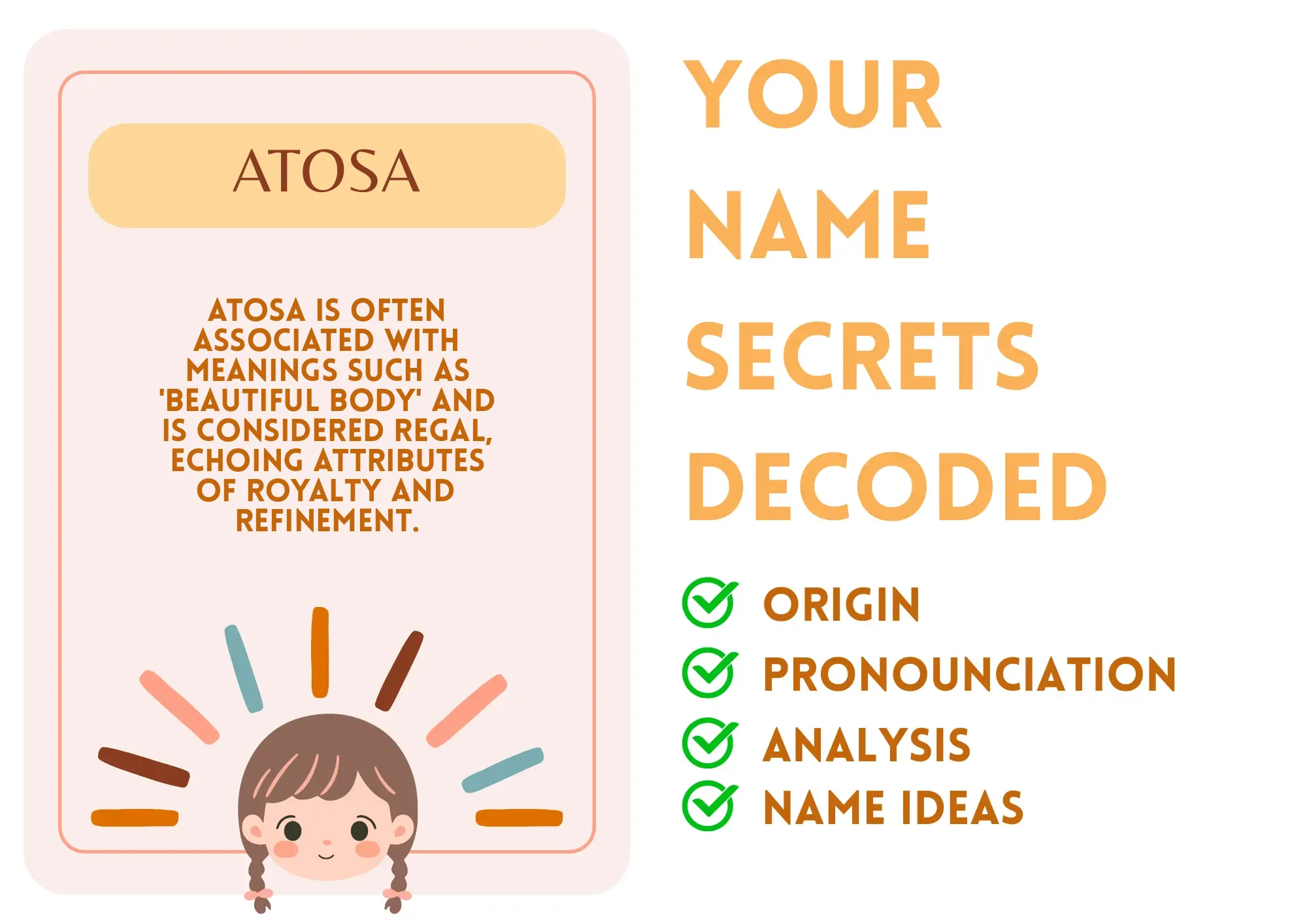
Atosa
Atosa is an elegant and culturally enriched name of Persian origin, known historically for its association with regality and wisdom. Primarily feminine, it carries with it connotations of nobility and intellect, making it a favored choice in several cultures. The name Atosa is historically significant, particularly in Persian history, and it continues to be a symbol of grace and strength.
Basic Information
Gender: Girl
Sounds Like: ah-TOH-sah
Pronunciation Explanation: The emphasis is on the second syllable 'TOH', with the initial 'ah' being soft and the final 'sah' being softly pronounced.
Summary and Meaning
Meaning: Atosa is often associated with meanings such as 'beautiful body' and is considered regal, echoing attributes of royalty and refinement.
Origin: The name Atosa has Persian origins and is deeply rooted in Iranian history and culture.
Usage: Atosa is traditionally a feminine name, celebrated for its elegance and historical significance in Persian culture.
Name Number (Chaldean)
Name Number (Pythagorean)
Popularity (Global Rank)
Overall: 95101
Girls: 58767
Most Popular in
Religious and Cultural Significance
Religion: The name Atosa does not have a direct connection w
Background: While Atosa is not directly linked to religious connotations, it belongs to a culturally rich background that spans centuries in Persian tradition.
Cultural Significance: As a name deeply embedded in Persian culture, Atosa is associated with historical figures of significance, symbolizing wisdom and sovereignty.
Historical Significance: One of the most notable historical references is Atossa, the daughter of Cyrus the Great and the wife of Darius I, Queens of the Achaemenid Empire, making it a regal name connected to historical influence and power.
Popular Culture
Literature and Mythology: Atosa has been referenced in various historical texts and plays, often as characters symbolizing strength and wisdom.
Movies and Television: While not as common in Western media, Atosa can be found in media within Persian-speaking communities, often depicted as royal figures.
Feelings and Perceptions
Perception: Atosa is seen as a name evoking nobility and elegance. It’s often appreciated for its historical richness and beautiful phonetic flow.
Positive Feelings: Unique, regal, cultured, insightful, strong, beautiful.
Negative Feelings: May be unfamiliar outside of Persian-speaking regions; pronunciation could be challenging for some.
Practical Considerations
Ease of Writing and Calling: Atosa is relatively easy to write and pronounce, though the unique combination of its letters might require initial guidance for those unfamiliar.
Common Typos and Misspellings: Atossa,Athosa,Atoosa,Atosae
Common Nicknames: Attie,Tosi,Ata
Atosa Popularity
Atosa Usage and Popularity By Country
| Country | Rank (Overall) |
|---|---|
| Iran | 2473 |
| Sweden | 4050 |
| Norway | 12941 |
| Russia | 23691 |
| Germany | 31516 |
| Canada | 35740 |
| Belgium | 48129 |
| United Kingdom | 64637 |
| United States | 65410 |
| Netherlands | 70785 |
Atosa Usage and Popularity By City
| City | Rank (Overall) |
|---|---|
| Orange County | 4831 |
| Goteborg | 2183 |
| Toronto | 20868 |
| Sodertalje | 710 |
| Boston | 19013 |
| Richmond Hill | 2005 |
| San Francisco | 29357 |
Compatibility Analysis
Famous Persons Named Atosa
No results found for Atosa.
Related Names
Similar Sounding Names:
Ayla,Aria,Asha,Adora